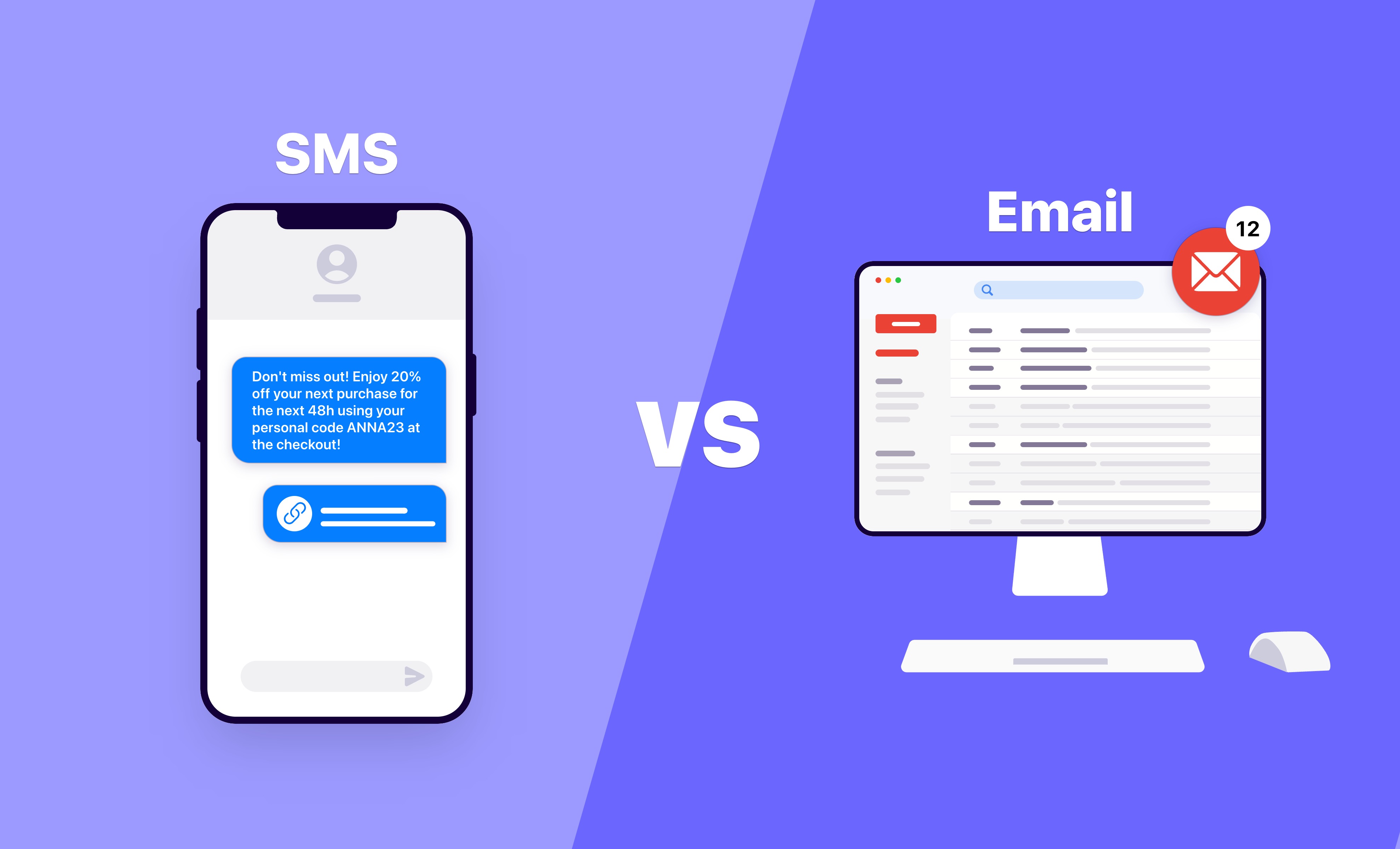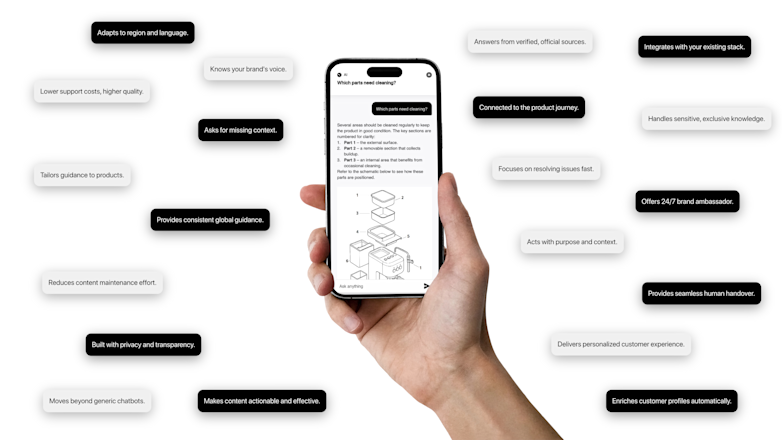
SMS and email marketing are two popular marketing strategies used for reaching out to customers directly. Text messages are used in SMS (Short Message Service) marketing, a type of direct marketing, to connect with consumers. It contains advertisements, savings offers, and appointment reminders too.
Email marketing is utilizing email to distribute promotional messages, typically to a group of recipients. Newsletters, surveys and feedbacks, customer appreciation, and promotional emails are among the most popular. This kind of email marketing strategy can be utilized by business online, to strengthen client connections, boost sales, and generate leads.
In this blog post, we'll examine both types of marketing in-depth and attempt to contrast them. Why is SMS marketing becoming more and more popular among businesses?
What is the Difference between SMS and Email Marketing?
SMS are usually sent in real-time and have a much higher open rate than emails. They also provide a more personal experience as they can be tailored to the recipient's preferences and interests. On the other hand, emails offer more flexibility regarding design, content, and tracking capabilities that allow marketers to monitor customer engagement with their campaigns.
SMS marketing
SMS marketing, also known as a text marketing campaign or text message marketing, is a type of marketing strategy in which promotional messages, offers, or alerts are sent to customers via text messages. SMS marketing has seen a significant increase in popularity in the United States, with the market reaching 6.2% and projected to reach a valuation of $31.7 billion in 2023. Globally, businesses are predicted to spend $50 billion on SMS messaging by 2025.
This type of marketing utilizes mobile phone technology and is frequently targeted to specific customer segments based on their preferences or behavior. SMS marketing is commonly used to promote products or services, raise brand awareness, and foster customer loyalty.
SMS marketing campaign send messages that are typically short and concise, with a clear call-to-action designed to encourage customers to participate in the promotion or offer. This type of marketing campaigns can be extremely effective due to their high open rates, rapid response rates, and low cost.
Email marketing
Email marketing is a digital marketing strategy that involves sending commercial messages, newsletters, or promotional emails to a group of people via email. Email marketing campaigns have been widely used by businesses, 33% of marketers send weekly emails and 26% send emails multiple times per month.
Email marketing is a cost-effective way for businesses to reach their target audience and build brand awareness, and it is often used to promote products or services, share updates or news, and build customer loyalty.
Email marketing campaigns usually involve creating a list of email subscribers, who have given their permission to receive emails from a business. The emails sent in these campaigns are typically personalized and segmented to target specific customer groups based on their preferences, behaviors, or demographics. Email marketing is an effective way to reach customers directly, and its success is measured by open rates, click-through rates, and conversion rates.
SMS marketing vs. Email marketing
Here’s a table that summarizes the differences between SMS and Email marketing:
Parameters | SMS Marketing | Email Marketing |
|---|---|---|
Open rate | ||
Click-Through Rate (CTR) | ||
Average response time | ||
Number of SMS/email received per day | ||
Conversion rate | ||
Cost | 5 to 15 cents per SMS | Monthly costs from $9 to $1,000 a month |
Return on investment (ROI) | ||
SPAM |
The effectiveness of either strategy depends on how well you understand your target audience and tailor your marketing message accordingly. Let's explore each parameter individually.
Open Rate
Emails have an open rate of 22%. Text message (SMS) marketing has the potential to be much more successful than email marketing due to its high open rate of 98%. So, more people are likely to respond to your messages and interact with you.
Compared to emails, which can take up to 90 minutes before they're opened, text messages are usually opened within 90 seconds of being sent. This immediacy provides an advantage for SMS' marketing efforts in getting customers' attention and communicating directly with them.
Click-Through Rate
The click-through rate of SMS marketing is typically higher than email marketing. SMS marketing typically has a click-through rate of around 19%, while email marketing typically has a click-through rate of around 3%.
Deliverability
Text message marketing tends to have a higher deliverability rate than email marketing since most text messages are opened within minutes of being delivered. Text messages are less likely to be flagged as spam than their email counterparts.
Not to mention, SMS messages are commonly read on mobile devices, which inherently have higher open rates than desktop devices.
Email marketing, however, has a much lower deliverability rate since they have to go through multiple spam filters before they get to their intended recipient.
You can opt for the delivery channel depending on the kind of messaging and the reason behind the communication. If you want to notify your customers about a limited deal, SMS marketing will prove to be more worthwhile, but if you are seeking feedback, email marketing works better.
Customization
SMS and email marketing can be customized in various ways. For SMS, marketers can customize messages based on the customer's location, preferences, purchase history, or other criteria. This can help ensure the message is relevant and engaging for the customer. Marketers can use specialized keywords, URLs, and tracking codes to measure the effectiveness of their campaigns.
For email marketing, marketers can customize messages by using personalization tags. This allows them to customize emails with the customer's name, company name, or other specific information.
Moreover, marketers can craft targeted messages based on the customer's purchase history, location, or other criteria. They can use A/B testing to optimize their emails for maximum engagement.
What are the Advantages of SMS Marketing?
Today, almost all brands across every industry niche use SMS as marketing channels to reach their end users. But why has this marketing channel garnered so much popularity? Let's explore the benefits of using sms marketing.
1. Reach
SMS campaigns allow you to reach many people quickly and easily, as almost everyone has a mobile phone.
2. Cost-effective
SMS marketing is relatively inexpensive compared to other marketing and advertising forms.
3. Targeted
SMS campaigns allow you to target your audience based on age, gender, location, interests, and more.
4. Easy to Track
Tracking your SMS campaigns is easy. You can easily track how many people opened your message, clicked on a link, and more.
5. Personal
SMS messages are often seen as more private than other forms of marketing, helping to create a better connection with your customers.
6. Quick Delivery
SMS messages are typically delivered within seconds of being sent. This means that you can reach your customers almost instantly.
What are the Disadvantages of SMS Marketing?
While SMS marketing can be a highly effective marketing strategy, there are some disadvantages to consider, including:
1. Limited message length
SMS messages are limited to 160 characters, which can make it challenging to convey a complete message or provide detailed information.
2. Permission-based
SMS marketing requires businesses to have customers' permission to send them text messages. This means that businesses cannot simply send messages to any phone number they want, and they must comply with strict laws and regulations governing SMS marketing.
3. Opt-out rate
While SMS marketing has high open rates, it also has a higher opt-out rate than other forms of marketing. This means that some customers may become annoyed or overwhelmed by frequent text messages and opt-out of future messages.
4. Lack of visuals
SMS messages are limited to plain text, which can be less engaging than other forms of marketing that can include visuals such as images or videos.
5. Deliverability issues
SMS messages are sometimes blocked or filtered by mobile carriers or devices, which can affect the deliverability of messages.
Overall, while SMS marketing can be a highly effective way to reach customers, businesses must be aware of these potential drawbacks and take steps to mitigate them to ensure the success of their campaigns.
Best Practices of SMS Marketing
Abiding by the best practices of SMS marketing ensures that your business is sending messages compliant with privacy laws, maximizing the effectiveness of all messages, and bringing down the risk of alienating your customers.
By following the best practices, your company can ensure that it sends timely, relevant, and secure messages. This way, your customers receive interesting, engaging messages that contain useful and accurate information.
Here are a few best practices of SMS marketing:
Create a Clear Call-to-Action: Provide clear instructions to your customers on what they should do after receiving your message.
Include Opt-Out Instructions: Always include a visible opt-out option in your messages. 18% of customers prefer having a clear opt-out option. Consumers want to stay in control of every brand interaction. Empowering customers helps to retain them.
Personalize Your Messages: Use personalization to make your text message more engaging and relevant to the recipient. 56.7% of users believe a personalized response is a big factor that helps improve their shopping experience.
Use Segmentation: Segment your audience into different groups to create more targeted messages.
Track Performance: Track the performance of your messages to see which strategies are most effective. It is important to monitor whether a text message perform better than others.
Keep Messages Short and Sweet: Keep your messages short and to the point to ensure they are easily understandable and actionable.
Use a Scheduling Tool: Use a scheduling tool to ensure that messages are sent at optimal times. Nobody wants brand messages popping up at all times or even at odd times.
Follow Regulations: Ensure you follow all applicable regulations and laws when sending SMS messages.
SMS marketing strategy can succeed when leveraged well and combined with other marketing methods, marketing tools such as email and social media, to create a holistic customer experience.
Examples of effective SMS marketing campaigns
Here are some of the most effective SMS marketing initiatives:
Welcome Messages: When a client onboards your brand, send them welcome messages to feel special and connected to the brand. SMS can be a great way of notifying people about their shipment details, refund details, and other important communication.
Coupons and Discounts: Sending out SMS with coupons and discounts can be a great way to encourage customers to take advantage of your services or products.
Time-Sensitive Messages: Time-sensitive messages can be a great way to encourage customers to take action quickly. This could be effective for limited-period offers or for a new product launch.
Reminder Messages: Reminder messages can help customers stay on top of their appointments or tasks.
Keep Customers Updated: Keeping customers updated with the latest news and updates related to your business can be a great way to maintain engagement.
Two-Way Communication: By allowing customers to engage in two-way communication, you can build relationships and provide personalized customer service.
Rich Media Messages: Rich media messages can help to add visual interest and engagement to your SMS campaigns.
SMS marketing has garnered widespread attention since it is an effective and efficient way to reach an extended audience while simultaneously generating a higher response rate. It leverages the power of text message to deliver promotional messages directly to your customers’ phones, letting your business reach customers quickly and easily.
It has been estimated that over 40% of e-Commerce sales in the USA take place through a mobile device. Thus, email marketing is a great way to channelize this revenue stream. But finding the right balance between the frequency of messages sent and the information in them is important. 31% of people unsubscribed from SMSes from brands because they were "too spammy," while 30% said they received too many messages.
SMS marketing holds great potential, especially for small businesses with shoe-string marketing budgets but one that requires maximum ROI. 86% of small businesses using sms marketing platforms campaign shown a higher engagement rate than email marketing.
Create SMS Marketing Campaigns With Layerise
Layerise is a comprehensive marketing automation platform that allows businesses to create and execute personalized SMS marketing initiatives with ease. It offers a range of features designed to help businesses optimize their campaigns and achieve their marketing goals.
One of the key features of Layerise is its ability to segment customers based on their behavior, preferences, or demographics. With this feature, businesses can create targeted messages that are tailored to specific customer groups, increasing the chances of customer engagement and conversion.
Advanced analytics capabilities
Another important feature of Layerise is its advanced analytics capabilities. These analytics provide businesses with valuable insights into the performance of their campaigns, including open rates, click-through rates, and conversion rates. This data allows businesses to identify areas for improvement and optimize their campaigns for better results.

Automated campaigns for specific events
Layerise also offers the ability to create automated campaigns triggered by specific events, such as a customer making a purchase or opting in to receive messages. This automation helps businesses save time and resources while ensuring that their customers receive timely and relevant messages.
Templated to create appealing messages
Layerise also provides a range of templates and designs to help businesses create visually appealing messages that stand out to their customers. The platform also supports a range of integrations with other marketing tools, such as email marketing software and CRM systems, allowing businesses to streamline their marketing efforts and achieve greater efficiency.
Overall, Layerise is a valuable tool for businesses looking to enhance their SMS marketing campaigns. Its user-friendly interface, advanced analytics, and automation capabilities enable businesses to create targeted and personalized messages that increase engagement, build loyalty, and drive sales, resulting in more successful and profitable campaigns.
Learn how to collect valuable insights on your customers to sell even more.

How to Turn a New Obligation into a Growth with Layerise

A trusted, brand-safe AI assistant that knows your products, your customers and your content.





